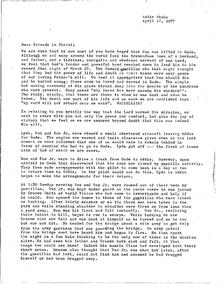W. Don McClure
[1] Although never fully staffed and interrupted by World War II, the Akobo mission became so successfully established that in 1950 the McClures were able to open new work among the Anuaks in the Ethiopian village of Pokwo.
By 1960, McClure was directing a third station at Gilo River while serving in Addis Ababa as the general secretary of the American Presbyterian Mission.
[6] McClure's American Presbyterian denomination had been working along the lower Nile in Egypt for several decades when the mission was requested to establish an outpost in Sudan.
At loose ends after college, McClure joined the Khartoum mission and found himself working in unfocused helpfulness as a teacher, agriculturalist, unlicensed physician, veterinarian, part-time evangelist, big-game hunter, and full-time handyman.
In this outpost, the McClures served their apprenticeship in frontier evangelism, agriculture, animal husbandry, rudimentary medicine, building construction, education, the languages and cultures of black Africa, and survival in primitive conditions involving almost daily encounters with lions, crocodiles, elephants, and hippos.
[10] Don McClure's Anuak Project was inaugurated at Akobo and came to an end at the Gilo River station, but its fullest and deepest expression was at Pokwo.
McClure secured an audience and the personal interest and permission of His Imperial Majesty, Haile Selassie I, to continue work in Ethiopia.
At Pokwo (in Anuak "village of life"), McClure was at the height of his powers in evangelism, agriculture, pioneer education, and primitive medicine as well as wisdom in combating superstition, especially witchdoctors.
The plan remained the same: a large group of specialists (in evangelism, education, agriculture, and medicine) deployed for a short period of time.
Among his most creative ideas, McClure challenged young American men and women to volunteer a year of service in Africa without pay.
In return, he provided them room, board, and plenty of work, which on the isolated and virtually inaccessible Gilo River meant first hacking an airstrip out of the forest.
However, due to McClure's persistence, a single exception was made for his old Sudanese colleagues who were able to continue their missionary work in East Africa.
With the hope that warring nomads would become peaceful agriculturalists, Haile Selassie, in person, asked McClure (and his church) to supervise the medical and educational work in this new city called Gode.
On that basis, in that he had given his word to the Emperor, and when no move was made to implement the program by the church officials in New York, McClure felt honor bound to begin by himself.
The guerillas who had rounded up the rest of the Smith family, two World Vision nurses and two German technicians were confused by the gunfire and ran away.



